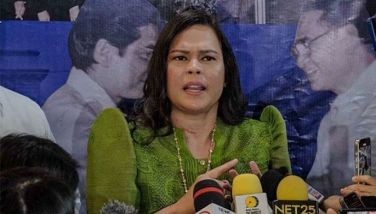Morato guilty of conflict of interest, says Jinggoy
MANILA, Philippines - Senate President Pro-Tempore Jinggoy Estrada believes that former Philippine Charity Sweepstakes Office (PCSO) board member Manuel Morato violated rules on conflict of interest when his former company forged a deal with the technology provider for online lottery operations to recover his investment in a failed hotel business.
Estrada said Morato’s former company, TF Ventures Inc., entered into an agreement with Perdana Land Philippines Inc.(PLPI), a subsidiary of Berjaya Philippines Inc. that owns the Philippine Gaming Management Corp. (PGMC), which in turn provides the equipment and software for the PCSO’s lotto operations in Luzon.
He said that Morato was clearly in conflict of interest because he was still a board member of the PCSO when TF Ventures and PLPI entered into an agreement for the sale of the former Best Western Astor Hotel of TF Ventures.
He pointed out that a memorandum of agreement was signed between the shareholders of TF Ventures and PLPI for the sale of the hotel and land for P785 million in December 2009.
The transaction was actually for the bank notes of Deutsche Bank, which acquired TF Ventures from the Landbank of the Philippines through the special purpose vehicle (SPV) law.
Landbank, one of the creditors of TF Ventures, was responsible for declaring the corporation along with the hotel as a non-performing asset, which was placed under the SPV.
Deutsche Bank bought the asset from Landbank and effectively placed it under receivership of the former.
Morato, who was the majority shareholder of TF Ventures, claimed that the corporation had accumulated P1.3 billion in debt and was in default, facing foreclosure.
He said that Berjaya, formerly Prime Gaming Philippines Inc. (PGPI), bought the debt paper of Deutsche Bank for TF Ventures “at a discount” and because TF Ventures could no longer pay the debt, the Makati Regional Trial Court approved a dacion en pago, placing the hotel under the ownership of Berjaya in 2010.
In April 2010, a deed of assignment was executed between TF Ventures and PLPI for the acquisition of the hotel by the latter for P70 million.
The deed was signed by Morato on behalf of TF Ventures and Tan Eng Hwa for PLPI.
Morato said that the P70 million was divided among the shareholders of TF Ventures and used as payment for its debts to its creditors.
He said that his being a shareholder of TF Ventures “is not in conflict with my position as director at PCSO.”
“PGPI only came up in 2010 and purchased the Deutsche Bank notes without my participation or initiative. I had nothing to do with that transaction. It was purely and exclusively a business transaction between PGPI and Deutsche Bank in which TFVI had no participation,” Morato said.
He added that the extension of the contract of PGMC with the PCSO was signed in 2006, way before the purchase of the hotel by PLPI was consummated.
Morato also denied that he received any cash from the sale of the hotel and in fact lost more than P100 million that he invested in the venture.
However, Sen. Franklin Drilon said that there is basis to the allegation of conflict of interest regarding Morato.
“The case was ongoing even before that (2006) because the financial problems of the corporation where Morato is a stockholder has been there for quite a number of years. There was already a financial problem while these negotiations (for the contract extension of PGPI with PCSO) are ongoing,” Drilon said.
Estrada said that he was certain there was conflict of interest “because why of all the buyers, it was Berjaya that bought the hotel.”
He said that it was clear Morato had a long and close connection with the people behind Berjaya.
In 1993, the PCSO entered into a lease contract with PGMC after a bidding for the provision of the machines and software to be used for the operation of the online lottery project or lotto.
Kilosbayan, led by former Senate president Jovito Salonga, challenged the contract before the Supreme Court (SC), which ruled that the contract of lease was contrary to law and invalid.
The SC argued that the contract of lease was actually a joint venture, thus contrary to the charter of PCSO.
In 1995, the PCSO, with the assistance of presidential legal counsels Antonio Carpio and Renato Corona, entered into an equipment lease agreement (ELA) with PGMC for the same purpose and was once again challenged by Kilosbayan before the SC.
This time around, the SC ruled in favor of the PCSO and PGMC, saying that the equipment lease agreement was valid as a lease contract under the Civil Code and consistent with the charter of the PCSO.
- Latest
- Trending





























